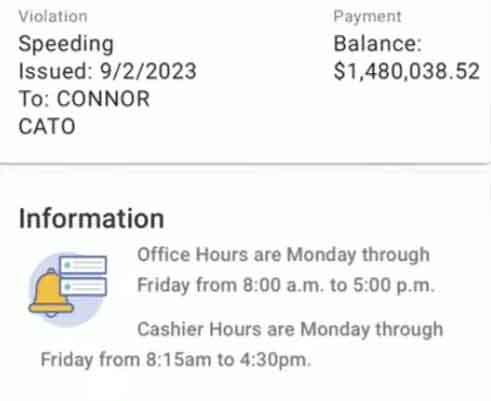SAVANNAH, GA – A Georgia man was issued a speeding ticket with a seven-figure sum, leading him to make an immediate phone call to the local courthouse to get to the bottom of the situation.
Connor Cato was pulled over by the Georgia State Patrol for driving 90 mph in a 55-mph zone in Savannah on September 2. Though expecting a significant fine, Cato was shocked when he was handed a ticket for $1.4 million.
“When I saw the figure, I couldn’t believe it. I thought it had to be a mistake,” Cato told local news outlet WSAV-TV.

The eye-popping figure led to immediate scrutiny from legal experts. Criminal defense attorney Sneh Patel weighed in, stating, “Not $1.4 million — that’s something that goes into cases that are drug trafficking, murders or aggravated assaults.”
The shocking sum was later revealed to be a placeholder generated by e-citation software used by the local Recorder’s Court. Joshua Peacock, a spokesman for Savannah’s city government, clarified that the amount is automatically applied to “super speeders,” or individuals caught driving more than 35 miles over the speed limit.
“The programmers who designed the software used the largest number possible because super speeder tickets are a mandatory court appearance and do not have a fine amount attached to them when issued by police,” Peacock explained.
Cato’s ordeal won’t end in financial ruin, as a judge will determine the real fine during a mandatory court appearance. The fine can’t exceed $1,000, plus state-mandated costs. “We do not issue that placeholder as a threat to scare anybody into court,” Peacock added, addressing the incident.
The bizarre case has spotlighted the potential pitfalls of automation in the legal system, even as the city government assures that the $1.4 million figure was never intended to be taken seriously. The experience nonetheless raises questions about the impact of technology glitches on due process.

